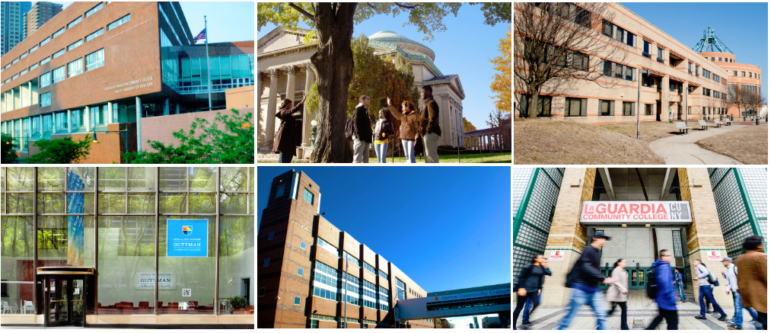
CUNY
Some of the CUNY schools, clockwise from top left: Borough Of Manhattan Community College, Bronx Community College, Kingsborough Community College, LaGuardia Community College, Hostos Community College and Guttman Community College.
Overcoming the “skills gap” in our workforce will be one of America’s greatest challenges over the next 20 years. Although the official unemployment rate hovers at around four percent, and the underemployment rate is estimated to be around 12.5 percent (Gallup), more than one quarter of small businesses report that finding qualified workers is their “single most important business problem” (National Federation of Independent Business).
Simply put, there are plenty of employees to be hired, but they don’t have the skill sets needed by employers, especially when it comes to “middle skills” jobs, defined by Harvard Business School as jobs that require more education than a high-school diploma, but less than a four-year college degree.
This skills gap has persisted for years, as employers have invested less and less in workforce development, ultimately weakening the pipeline of skilled workers. Concurrently, businesses have also failed to provide educators with accurate information on what skills and knowledge are needed to succeed in the job market, which has put students at a disadvantage.
Although politicians have tried to tackle the issue—President Obama, for example, had proposed free community college tuition during his term, albeit unsuccessfully—the biggest impact in closing the skills gap will ultimately come from businesses partnering directly with local community colleges on workforce development programs.
Partnering with community colleges
Business owners will find that community colleges provide a great way to build the recruiting pipeline. Not only do these colleges offer access to a diverse pool of talent, but the students usually have stronger roots to the local area. Those are the type of workers that tend to stay long term in their jobs.
Community colleges also have the benefit of flexible curricula, meaning that they are well equipped to quickly adapt their programs to the changing needs of the job market. As a business, this gives you the opportunity to play a major role in the training of future recruits, so that they are better prepared for the positions that you need to fill.
Below are some ways in which you can partner with community colleges and how your business will benefit.
Share your needs with educators. Conduct an audit to identify the skills needed within your company and industry, then share this information with your local community colleges. Practical knowledge can easily be addressed within community college coursework—but only if educators know that there is a need for it.
Project your future workforce needs and account for new innovations. Building a talent pipeline requires not just knowing what employees you need now, but also anticipating what skills you will need in the coming three to five years. You’ll want to work with local community colleges to get current topics into the curriculum now, so that your future recruits will be well trained before you take them on as employees.
Offer paid internships with class credit. Labor law issues aside, research shows that paid internships (over unpaid) can bring lots of benefits to a company. Paid internships increase the quality of the applicants, which in turn increases the overall value of the interns—they learn faster and can contribute more in their short time with the company. It’s also a good recruitment tool; paid interns are more likely to convert to full-time hires and stay with the company over the long term.
There is also an important social impact factor: diversity. Statistics show that Black and Latino students are more likely to hold debt or have financial needs that keep them from taking unpaid opportunities. By offering paid internships, such students don’t have to choose between a paycheck and a valuable work experience.
Speak to students about professionalism and soft skills. Well-rounded employees must do more than just fulfill job functions. They must also know how to conduct themselves professionally and work well in teams. To ensure the next generation of workers has a complete set of skills, business owners should speak to college students about working in professional environments. This includes sharing interview tips and employer expectations such as attire, timeliness, personal conduct and conflict resolution.
Making a local impact
At Creative Business Inc., we know firsthand how impactful these programs can be. We’ve partnered with LaGuardia Community College on its “First Break” program to help students who are studying accounting and business gain professional work experience. Not only have we hosted six paid interns, we’ve ended up hiring three of them as full-time staff—one of whom is currently working on his bachelor’s degree after graduating from LaGuardia and joining Creative Business.
Not only is working with community colleges a smart way to build up your company’s recruiting pipeline, but it also helps to strengthen your local community and make a big social impact. Students at these schools are often low-income minorities and likely the first in their families to attend college. By training and hiring such students, your business can help these individuals find good-paying jobs and financial stability.
Jeanne Hardy is the president of Creative Business, Inc., a business services and advisory firm in New York City.








